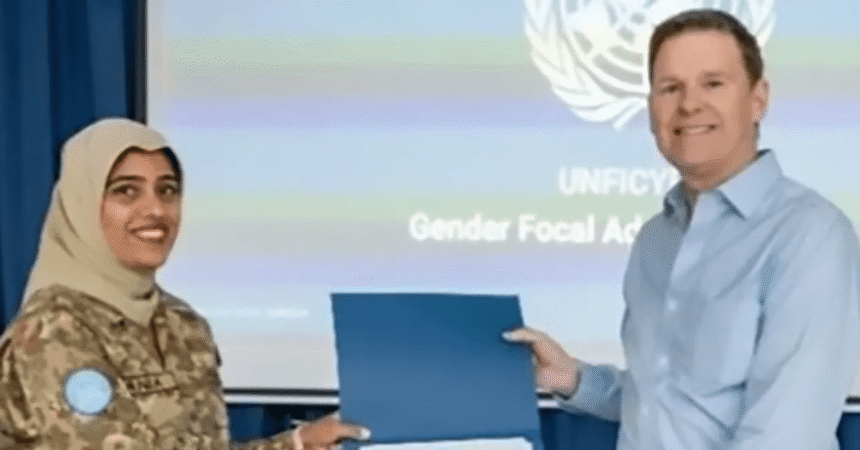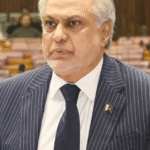In a groundbreaking achievement, Major Sania Safdar and Major Komal Masood, two female officers from the Pakistan Army, have been honored with the prestigious Gender Advocacy Award by the United Nations. The award was presented by the Under-Secretary-General of the Department of Peace Operations at a ceremony held at UN Headquarters in New York. This recognition not only highlights their personal dedication and professional excellence but also signifies the broader commitment of Pakistan to advancing gender equality and enhancing women’s roles in peacekeeping missions globally.
Background of the Award
The Gender Advocacy Award is a distinguished recognition given by the United Nations to individuals or groups that have made significant contributions to promoting gender equality and women’s empowerment within peacekeeping and related operations. This award reflects the UN’s ongoing commitment to ensuring that women play a central role in peace processes and conflict resolution efforts. Women peacekeepers bring unique perspectives and skills that are essential in building sustainable peace and stability in conflict-affected regions.
Profiles of Major Sania Safdar and Major Komal Masood
Major Sania Safdar
Major Sania Safdar served in the United Nations Peacekeeping Mission in Cyprus, where her responsibilities included not only routine peacekeeping duties but also engaging with local communities to foster dialogue and understanding. Her commitment to involving women in peacekeeping efforts was evident as she worked tirelessly to create opportunities for female local leaders to participate in discussions about peace and security. Major Safdar’s approach emphasized the importance of inclusivity in peacekeeping operations, recognizing that women’s voices are critical in shaping effective policies and initiatives.
Major Komal Masood
Major Komal Masood, on the other hand, was deployed in the Central African Republic (CAR), a region beset by conflict and instability. Her role involved working directly with local women and youth, addressing issues such as violence against women and children. Major Masood implemented programs aimed at empowering women through education and vocational training, helping them gain skills that would enable them to contribute to their communities’ recovery and rebuilding efforts. Her efforts not only provided immediate support but also laid the groundwork for long-term stability by fostering resilience among vulnerable populations.
The Importance of Women in Peacekeeping
The inclusion of women in peacekeeping missions has been increasingly recognized as essential for several reasons. First, women often serve as key communicators and mediators in communities affected by conflict. They can build trust and facilitate dialogue in ways that may not be possible for their male counterparts. Additionally, women peacekeepers can address the specific needs of women and children in conflict situations, ensuring that their rights are upheld and their voices heard.
Research has shown that when women are involved in peace processes, the resulting agreements are more likely to be sustainable. The UN has noted that peace agreements that include women are 35% more likely to last at least 15 years. This statistic underscores the critical role that women play not only in peacekeeping but also in conflict resolution and post-conflict recovery.
Recognition from Mission Force Commanders
Both Major Safdar and Major Masood’s contributions have been recognized by the Mission Force Commanders, further emphasizing their impact on the missions they were part of. Their leadership and dedication have set a precedent within the Pakistan Army, inspiring other female officers to pursue careers in peacekeeping and to strive for leadership roles within the military.
The recognition of these officers also reflects Pakistan’s commitment to the UN Peacekeeping mandate. The country has been a significant contributor to UN peacekeeping missions since 1960 and has consistently advocated for greater representation of women in these roles. By honoring Major Safdar and Major Masood, Pakistan demonstrates its commitment not only to global peace and security but also to the empowerment of women in traditionally male-dominated fields.
Challenges Faced by Female Peacekeepers
Despite the progress made in recognizing the importance of women in peacekeeping, female officers still face numerous challenges. Cultural barriers, security risks, and logistical issues often hinder their full participation. In many cases, women are underrepresented in peacekeeping forces, which limits the effectiveness of missions.
Moreover, female peacekeepers frequently encounter gender bias and discrimination, both within their own ranks and in the communities they serve. Addressing these challenges is critical for enhancing the role of women in peacekeeping and ensuring that their contributions are fully realized.
Support Systems and Initiatives
To combat these challenges, the UN and various member states, including Pakistan, have initiated programs aimed at supporting female peacekeepers. These initiatives include mentorship programs, training sessions that address gender-specific issues, and efforts to create a more inclusive environment within peacekeeping forces.
Furthermore, the UN has established policies and guidelines to ensure that women are not only included but are also given leadership opportunities within peacekeeping missions. These efforts are vital for fostering a culture of respect and equality within military and peacekeeping operations.
The Role of Pakistan in Global Peacekeeping
Pakistan has a long-standing history of participation in UN peacekeeping missions. Since its first deployment in 1960, the country has contributed over 200,000 personnel to various missions across the globe. Pakistan has consistently advocated for the importance of women in peacekeeping and has taken steps to increase the number of female personnel in its contributions.
The recognition of Major Safdar and Major Masood serves as a testament to the ongoing efforts of the Pakistan Army to promote gender equality. Their achievements not only enhance the reputation of Pakistan in international peacekeeping but also inspire future generations of female officers to pursue careers in the military and peacekeeping fields.
Conclusion
The recognition of Major Sania Safdar and Major Komal Masood with the UN Gender Advocacy Award is a significant milestone in the journey toward gender equality in peacekeeping. Their contributions highlight the essential role that women play in fostering peace and stability in conflict-affected regions. As countries continue to grapple with complex security challenges, the inclusion of women in peacekeeping efforts will remain vital for achieving sustainable peace.
By continuing to support and recognize the efforts of female peacekeepers, the international community can work toward a more equitable and effective approach to conflict resolution and peacebuilding. The achievements of Major Safdar and Major Masood exemplify the positive impact that dedicated individuals can have on global peace and security, serving as an inspiration for current and future peacekeepers.
#GenderEquality #WomenInPeacekeeping #UNPeacekeeping #PakistanArmy #WomenEmpowerment #PeaceAndSecurity #SustainablePeace #WomenLeaders #UN #GlobalSecurity







